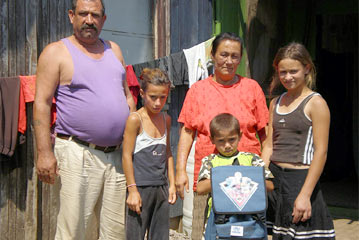Chechnya: some 170,000, remain in Ingushetia
Chechnya: some 170,000, remain in Ingushetia
While there has been a trickle of people going back to Chechnya, the bulk of the displaced population, estimated at about 170,000, remains in Ingushetia amid reports of fighting and instability in many areas of Chechnya.
While helping those who want to return, UNHCR and its partner agencies are making contingency plans for the coming autumn and winter, since continued instability in Chechnya and widespread devastation caused by the war make a massive return of the displaced unlikely before the winter.
At the urging of UNHCR, 12 federal government officials arrived in Ingushetia from Moscow this week to start issuing identity papers to people who lost their documents as they fled from Chechnya to Ingushetia. The temporary IDs will make it easier for the displaced to move through various checkpoints. They will also enable pensioners to receive their federal pension benefits. The identity issue, raised by UNHCR with the Russians on many occasions, has been one of our principal concerns, since it affects between 15 and 20 percent of the displaced.
Meanwhile, some of the 170,000 displaced hosted by Ingushetia have come under indirect pressure to leave. Earlier this month, for example, the Russian federal authorities removed several hundred internally displaced people from 10 railway wagons at Ingushetia's makeshift Severny settlement and transferred the empty carriages to Grozny, where most of the housing has been destroyed. The occupants had to find alternative shelter. In a separate development, the authorities on June 19 stopped supplementary hot food and bread distribution to the displaced, citing financial constraints. There are also reports of the displaced being under pressure to leave privately-owned abandoned buildings, factories and farms. Taken together, these developments indicate a pattern of pressure on the IDPs to leave.
UNHCR has told Russian authorities that despite various constraints, all efforts should be made to maintain Ingushetia as a safe haven. For its part, UNHCR is currently looking for a site to build a tent city for an estimated 12,000 people who may soon have to leave their makeshift accommodation. We are also looking at ways of supporting local Ingush families who host the displaced, by either giving them cash grants or paying their high utility bills.




